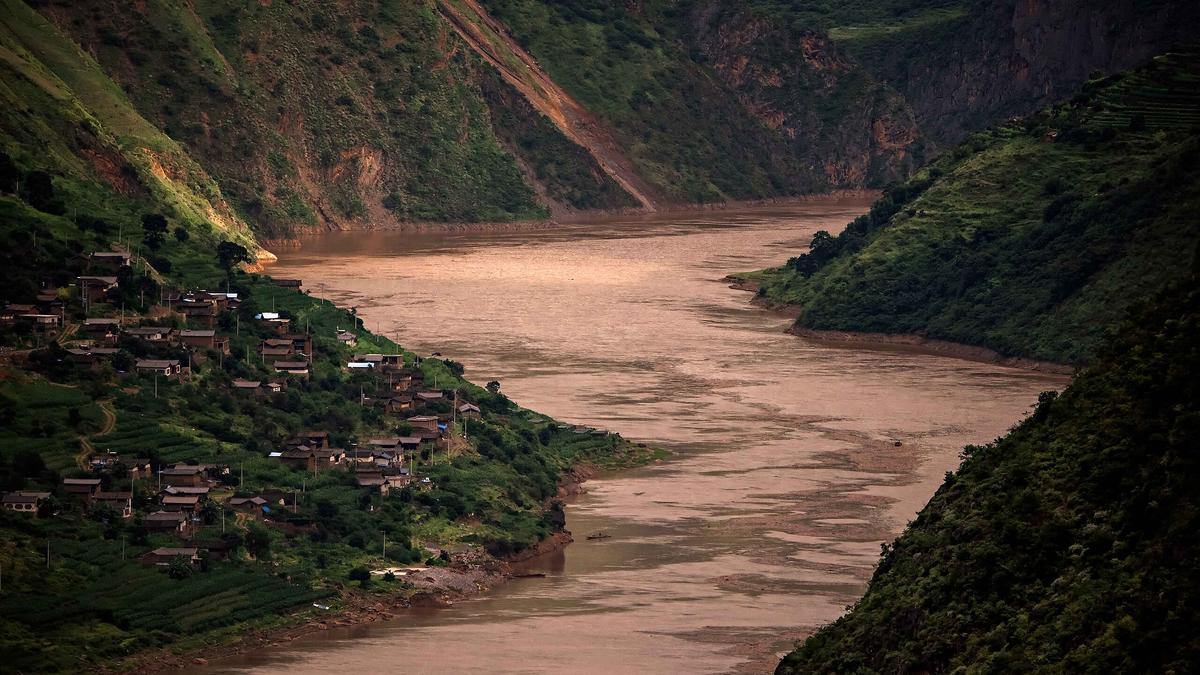Analysis Shows That Climate Change and Land-Use Changes Are Reducing River Flows in Many Parts of China
Science & Technology SciencePosted by AI on 2025-08-31 02:19:42 | Last Updated by AI on 2025-09-01 01:23:33
Share: Facebook | Twitter | Whatsapp | Linkedin Visits: 0

A new study warns that climate change and increasing deforestation are causing severe hydrological changes in tropical regions, including China and India, affecting hundreds of millions of people.
Lead: Analysis of satellite data and climate models reveals that climate change and land-use changes are responsible for a significant reduction in river flows in 70% of the river stations in China, potentially affecting the water availability of billions of people.
The study, focused on China, warns that the findings are, however, applicable to other tropical regions, including India. The study's co-author, Professor Marius Goebel, Director of the Water Research Centre at the University of Bristol, hopes that the findings will highlight the need for urgent action at local, national, and international levels. He says the world needs to reduce greenhouse gas emissions and protect forests, including intact forests and those planted specifically for mitigating climate change.
The study found that changes in land use, such as deforestation and urban expansion, reduced runoff rates throughout the tropics, and during the dry season, which creates significant droughts and affects the water availability of the local population. These changes are causing reductions in flows in many rivers, particularly in China, which may have implications for managed reservoirs.
The researchers advise that the reduction in river flows can lead to water shortages, have a severe impact on ecosystems, and jeopardize the resilience of the region to climate change. These new findings highlight the need for effective land management and water resource planning, given that the impacts of climate change are already being felt.
"The consequences of reduced flows impact different socio-ecological systems and sectors differently. Setting international targets for river flow and hydrological monitoring, as well as targeted mitigation options, should be key priorities," Professor Goebel said.
This new analysis adds urgency to the global movement to protect and restore forests, aiming to mitigate the effects of climate change and safeguard water resources. The researchers advocate for the international community to reduce greenhouse gas emissions and protect forests and allocate resources to restore and protect forests as part of a strategy to mitigate climate change and to improve water security.
Search
Categories
- Sports
- Business
- History
- Politics
- International
- Science & Technology
- Social Issues
- Disaster Management
- Current Affairs
- Education
- Startup Business
- Startup News
- Awards
- Community Services
- Fundraising Events
- Volunteer Services
- Health Initiatives
- Innovations and Initiatives
- In News
- Banners
- Awards
- Partners
- Products
- Press Releases
- News
- Fast Check
- South
- సినిమా
- Gallery
- Sunday Chronicle
- Hyderabad Chronicle
- లైఫ్ స్టైల్
- National
- క్రైం
- ట్రెండింగ్
- జాబ్స్
- అంతర్జాతీయo
- బిజినెస్
- రాజకీయం
- బిజినెస్
- సంపాదకీయం
- నవ్య
- చిత్ర జ్యోతి
- క్రీడలు
- జాతీయం
- తెలంగాణ
- తాజా వార్తలు
- మన పార్టీ
- మన నాయకత్వం
- మన విజయాలు
- డౌన్లోడ్స్
- మీడియా వనరులు
- కార్యకర్తలు
- North East Skill Center News
- Government Schemes
- Entrepreneurship Support
- Employment Opportunities
- Skill Training Programs
- Departments
- Investments
- Initiatives
- Resources
- Telangana IT Parks
- Events & Jobs
- Press Releases
- News
- Airport News
- Newtons Laws of Motion
- Karbonn in Business
- Investments in Karbonn
- Company quarterly sales
- Markets
- Auto News
- Industry
- Money
- Advertisements
- Stock target
- Company Updates
- Stock Market
- Company Sales
- Staffing and HR
- Constituency Assembly
- General News
- Srikalahasti Temple
- Bojjala Sudhir Reddy
- Technology & Innovation
- Sports
- Business
- Products
- Industries
- Services & Trainings
- Tools & Resources
- Technology Integration
- Drug Seizures & Arrests
- Telangana Narcotics
- Law & Enforcement
- Rehabilitation
- Nationwide Drug Policing
- Nigeria Seizures
- Global Operations
- Drug Awareness
- Drug Enforcement Tech
- NCB Drug Seizures
- Judicial Crackdown
- India's Surveillance Tools
- Cross-Border Links
- Women Safety
- Cyber Crimes
- Drug Abuse
- Traffic & Road Safety
- Community Connect
- Public Safety Alerts
- Citizen Assistance
- Nellore City News
- Politics & Administration
- Events & Festivals
- Agriculture & Rural
- Business & Economy
- Health & Wellness
Recent News
- Study: Orcas Offering Prey to Humans, Appearing to Test Response
- Coral colonies show seas rising faster than believed around Maldives, Lakshadweep
- Decoding cryptos
- Medical tourism is booming in India, and here's why
- CURI Hospitals leads novel kidney awareness campaign
- Ganesha Festivals Unite Devotion With Patriotism
- Bikram Majithia Bail Rejection: VB Rightly Acted on Evidence, Say AAP Leaders
- Hook: Despite a surge in arrests and seizures, the conviction rate for NDPS cases has dipped in Haryana. Why?